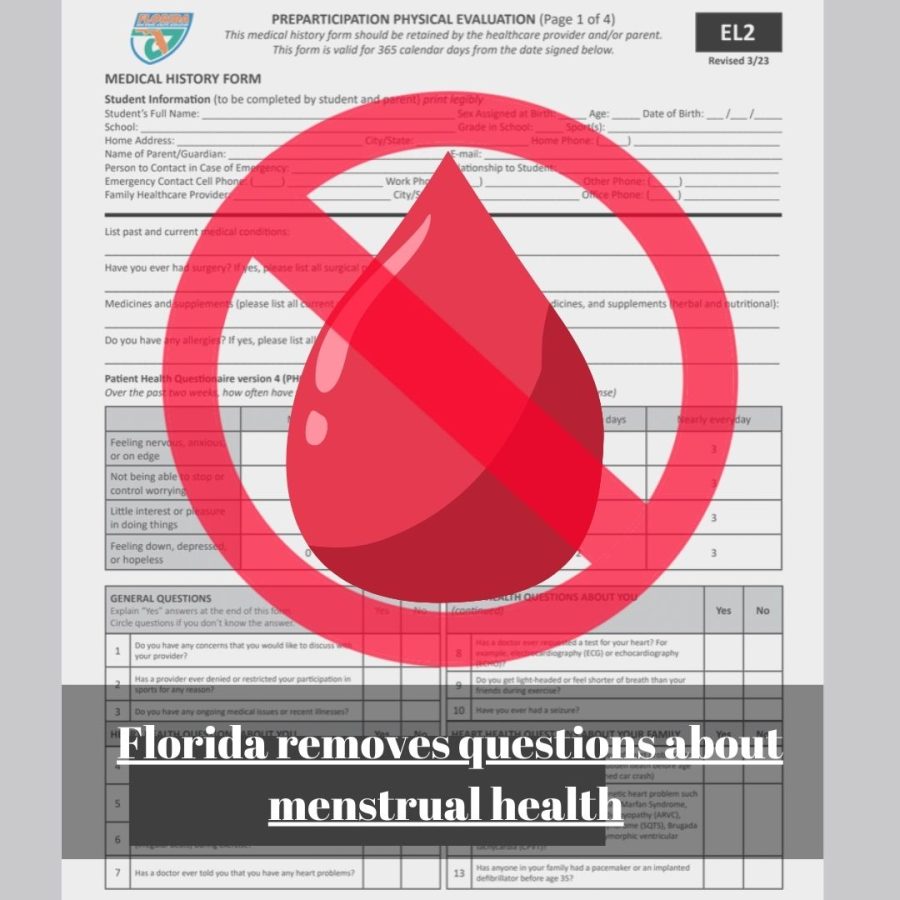Florida removes menstrual questions on high school physical forms
Florida’s new physical form no longer has questions about menstrual health.
April 20, 2023
On Feb. 2, the Florida High School Athletic Association (FHSAA) Board of Directors held a meeting to discuss removing questions about menstrual health from high school physical forms. The vote was 14 to two for the removal of the questions about menstrual health. The board was comprised of 14 men and two women. These forms have had questions about menstrual health for 20 years, and the removal raises questions about the continued safety of the female student-athletes in Florida.
Chris Patricca, a director on the FHSAA board who voted against removing the menstrual question from health forms said the long term impact on female student-athletes would be negative. Patricca spoke about some of these impacts during the Board of Directors meeting.
“It is ensuring that screening questions are required that could lead to the avoidance of serious short term, and long term debilitating [health] conditions for female student athletes,” said Patricca. “I would argue that the elimination of the questions is discriminatory towards female athletes because we are not instituting practices that could protect them.”
Heidi Strickler is a specialist in sports diets and how the menstrual cycle affects a one’s health. She is an expert on the health issues that can result from poor menstrual health in athletes with a uterus.
“The menstrual cycle can clue us into under-fueling or low energy availability; it indirectly has an effect on all the systems, because it can help us count on things like early prevention or stopping something before it gets too serious,” said Strickler.
The board stated the reason for deliberating whether to remove menstrual questions began with a concern for athletes’ privacy.
One of the solutions suggested was to keep the first three pages of the physical private for just parents and healthcare providers. The board accepted this suggestion but also removed any questions about menstrual health.
Strickler thinks this is a mistake.
“When we don’t talk about it, it creates a misconception that it’s embarrassing, that it shouldn’t be talked about, and also that it’s not important. And those ideas are incredibly harmful,”said Strickler.
Menstrual cycles are important in maintaining function and health throughout all the systems of the body. Strickler says athletes with a uterus need to be able to talk about and be educated on their menstrual health. It is necessary to help them learn any warning signs that can help prevent long term damage to their health.
“There is a lot of knowledge that can come from just tracking your cycle and knowing what symptoms are normal for you. [There can be] so many negative symptoms associated with a menstrual cycle,” said Strickler. “But if people will actually track and learn when their symptoms come and what’s normal for them, there is also a lot you can do to minimize those symptoms, which are also going to help with overall mental health outcomes in athletes.”
The Lincoln chapter of PERIOD is working to make education around menstruation more accessible by having conversations around menstrual cycles, women’s rights and ways of outreach to those who might not have access to the same products or education.
“We want to be a space where people can come and talk about their periods and express concerns and know that periods are a very integral part of your health and it is important to advocate for yourself,” said Caroline Ambrose.





